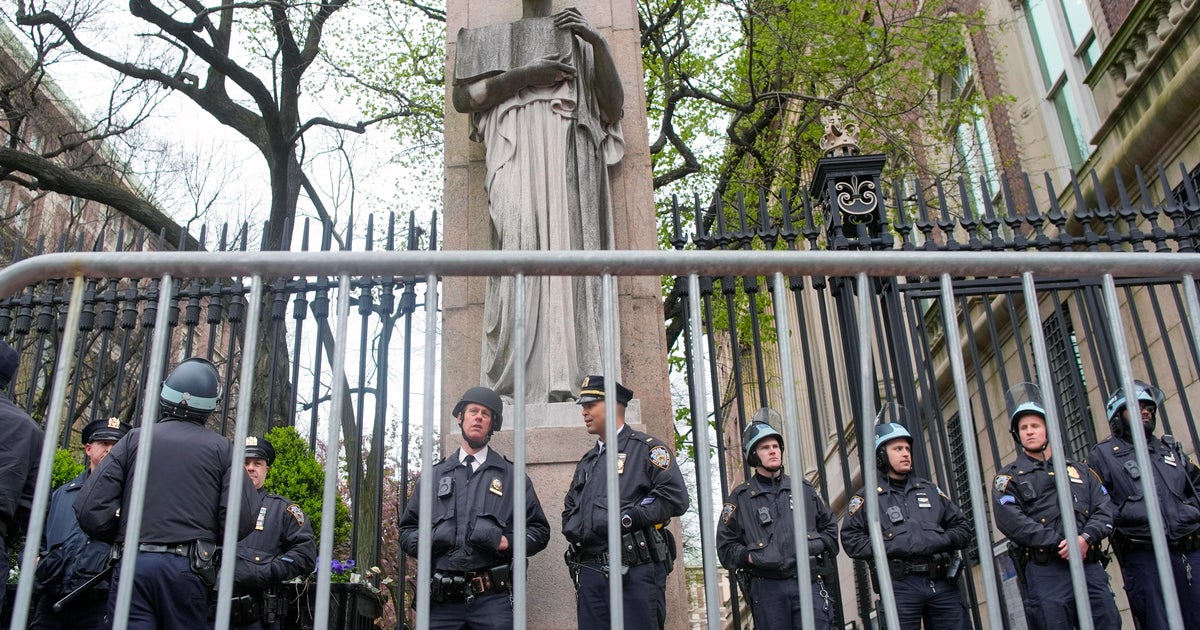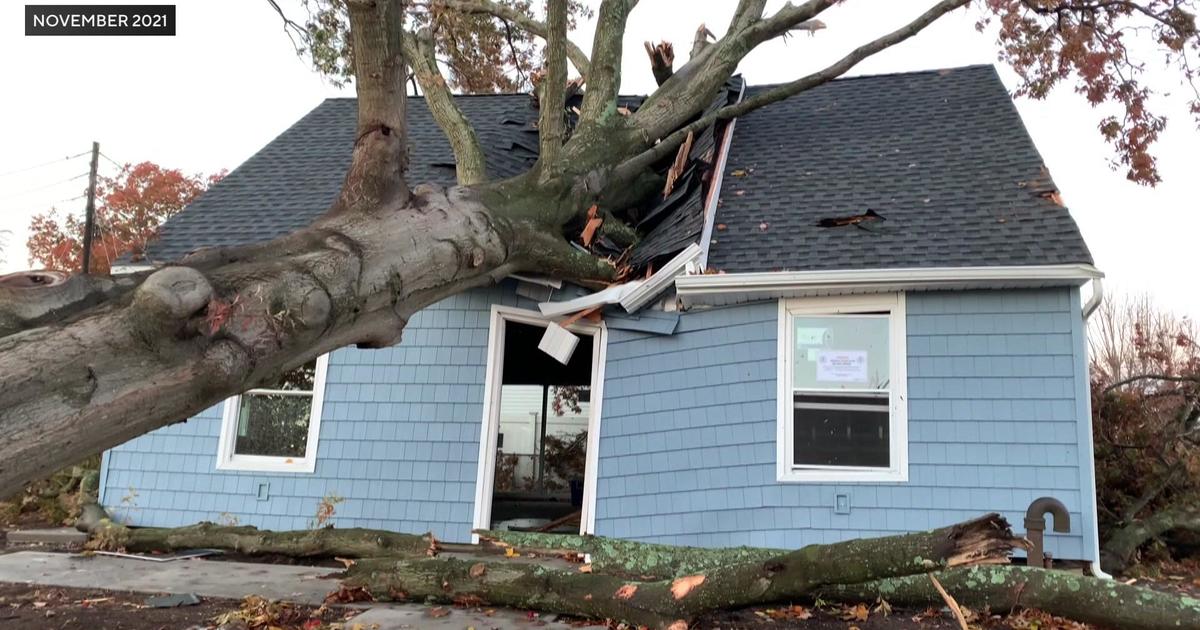Candidate Conversations: Eric Adams
NEW YORK (CBSNewYork) - Early voting is underway in New York City's mayoral election, with election day just a week away.
Tuesday, CBS2's Marcia Kramer and Maurice DuBois sat down with Democrat Eric Adams as part of our "Candidate Conversations" series.
You can see their full conversation in the video below --
Wednesday, we sat down with Republican candidate Curtis Sliwa. You can see their full conversation here.
Here's just some of what DuBois, Kramer and Adams discussed.
MAURICE DuBOIS: You're a former cop, a former Republican, a former lawbreaker who was beaten by cops, a lot of formers. Just who exactly is the current Eric Adams right now?
ERIC ADAMS: Well, I say this all the time, Maurice, I'm perfectly imperfect, and I'm evolving. I'm evolving as a man. I'm evolving as a dad, I tell my son that all the time, and I'm going to evolve no matter what. I'm a person that, I'm not looking for perfection. That's not a humanistic characteristic. I'm looking for dedication. I'm committed to this city. Every area of my journey has shown 35 uninterrupted years of commitment to the city. There were days I didn't want to get out of bed and wish I didn't, but there were days I was happy I got out of bed because I did some great things in the process.
MARCIA KRAMER: So your opponent, Curtis Sliwa, is accusing you of basically being Bill de Blasio 2.0. I'm wondering, is he right? But also, what are the six degrees of separation between you and Bill de Blasio? What are his strengths? And what are his weaknesses?
ADAMS: I say this over and over again. He walked in his pair of shoes, I'm going to bring my own. And I have my way of governing in a real way that I think, in some areas, we're similar, in some areas, we're different. Listen, let's take our hat off to the fact of what he did with pre-K. I know what it is not to get a quality education.
KRAMER: So that's a strength. What's a weakness?
ADAMS: Well, a couple of things, I believe a weakness: We did not go into government and find the inefficiencies that I believe we should do.
It's clear that we are wasting taxpayers' dollars and we're producing an inferior product every day. And we're not aligned as a city.
Remember, cities are made up of agencies. If those agencies are not producing a qualitative product then our tax dollars are being wasted and we're not doing it. We increase our budget by almost $20 billion. We have ballooned to almost a $98.7 billion budget. That's just not acceptable to run the city. We can find fat and mismanagement.
KRAMER: Do you have an idea where that fat might be?
ADAMS: In many areas. Number one: Overtime in the New York City Police Department. You go to parades, you see large number of police officers congregating. Many of them are on overtime. We can have public safety at the right cost. And we look at how we do good to services and procurement. Some of our contracts in the Department of Education. Why are we still having the same contract when 65% of Black and Brown children never reach proficiency in our city, but we still hire the same people. It makes no sense to me.
DuBOIS: You said bigger budget, inferior product. What do you mean inferior?
ADAMS: Well, the number I just gave you, we are spending large sums of money to do things, and NYCHA, we spend billions of dollars in NYCHA. Is NYCHA cleaner? Is it safe? Have we dealt with the rolling aspects of NYCHA?
We spend billions of dollars in the Department of Education, that's our largest budget. But every year we have the same group of students from the same demographics in the same schools that's not reaching proficiency. We do nothing for dyslexia training, a screening. We do nothing around giving parents the support they deserve.
So we - Health + Hospitals. Health + Hospitals, primary care can't be the emergency room, or an urgent care center. So the money we're spending, taxpayers are not getting their money's worth.
KRAMER: So it sounds like there's much more than six degrees of separation between you and Bill de Blasio.
ADAMS: It's just a different mindset. And I'm learning from him. I'm learning from previous mayors, sitting down with the previous mayors, previous deputy mayors and saying, how do we get it right? Where did you drop the ball? And how do we do it right? Homelessness. The mayor admits himself, we should have done better in homelessness. I want to know from him, where did you drop the ball? How can I be better at it?
KRAMER: Did he admit that he dropped the ball, and does he tell you how?
ADAMS: Yes, he stated that he could have done better. I think that we could have used the dollars that would come, that came from our mental health, because when you see street homelessness, you're talking about those with mental health illnesses. We should have zeroed in on that. Rebuild trust, looking at our subway system and other places where people are sleeping on the streets. That's not dignified to be able to sleep on the street or in the subway system.
KRAMER: So, you know, you've aligned yourself with bike advocates, even riding a bike to a press conference, which we were watching the other day. But I wonder what kind of a message that sends to the tens of thousands of people in New York who are terrified to walk on the streets because of people on bicycles, scooters, e-bikes, they feel the rules of the road don't apply to these people, because they ignore red lights, one way streets, even bike lanes. They say it's bike bedlam. What will you do? When you become mayor, if you become mayor, excuse me, to crack down on bike violators? And should they have license plates to make it easier for police officers to go after them?
ADAMS: Everyone has to follow the law. That's the bottom line.
KRAMER: That's not going on in the city right now. You know that.
ADAMS: Without a doubt. And that's why you asked, what would I do?
KRAMER: So what would you do?
ADAMS: On Eric Adams' rule, we're going to - you can't have crash fatalities with bikes and cars and not have enforcement. Enforcement has dropped. Once you set the right tone, that you can't drive an ATV on our sidewalks, that you can't ride bikes up and down the streets anywhere and on the sidewalks, scooters, the city has -
KRAMER: But what about just going the right way on a one way street?
ADAMS: I'm 100% with you. I follow the bike laws, I follow the rules.
KRAMER: But not everybody does that.
ADAMS: That's why you have to do the proper enforcement.
KRAMER: So what's the proper enforcement?
ADAMS: Some of that enforcement is about giving people warnings. You know, you take that information, you log it in a centralized database, that you receive a warning. Second time, it's coming with a citation, or it's coming with a ticket. That's used technology.
KRAMER: What's the right fee? What's the right ticket?
ADAMS: The dollar amount could be anywhere from $50 to $100. You want to send the right message. We want safe streets not only from vehicles and vehicle crashes, but from those who are using other methods of transportation outside of -
DuBOIS: Should bikes have license plates?
ADAMS: No, I don't believe that. I don't believe that they need license plates. If you are a rider, because, let's say you have license plates, and you stop someone that, they do not own the bike. That's not connected to the person that's violating the rule. But if you stopped someone and use a centralized database that you did an infraction, you give them a warning summons, a warning, you could put that information into a handheld that is centralized. So if another officer stops him for the same thing, now they get a citation.
KRAMER: Would you use police officers to do that or would you use traffic enforcement agencies to do that? Who's the right person?
ADAMS: Combination, police personnel and traffic enforcement. A combination. But again, we're going to be dealing with a centralized system. So that same handheld information that the traffic enforcement agent has, the police officer has as well, Department of Sanitation employee will have as well. The name of the game is identify those who are breaking the law so that they will be held accountable.
DuBOIS: You're going to put bike riders on notice day one.
ADAMS: Day one, because I'm one of them.
I have to follow the rules. And we can't advocate for vehicle crashes to stop when we add to it by creating a dangerous environment. Because people are frightened if someone is speeding on a bike path, or a scooter or bike, they're still frightened. We need safe streets for everyone.
KRAMER: So let me ask you this question. Once Rikers Island is closed, what should be done with the land? Now, how about turning it into a vast urban farm where you could raise vegetables? You could even have jobs for the homeless. You could put bunk houses there for people to live. How do you like that idea?
ADAMS: Now, you know you're going right to my heart. And it's a multi-billion dollar industry. Why are we getting our fruits and vegetables from other parts of the country? Technology has shown - I did a plan with NYU Business Center and Cornell University, Urban Agenda, Agricultural Report, we can grow our food, fruits and vegetables, right here. Hydroponics, greenhouses...
KRAMER: So Rikers Islands Farms?
ADAMS: Listen, I'm open to that, I think that we should put out RFPs and ask people. We can teach children how to grow healthy food. We can deal with the crisis of eating bad food. We can have employment. We can actually start shipping food to other parts of the country.
KRAMER: You could have chickens, cows...
ADAMS: You're not gonna get into chicken and cows with me.
KRAMER: No chickens and cows, I know you're a vegetarian.
ADAMS: But you're right, I agree with you.
KRAMER: I mean, think about - the question really, is, goes to an interesting level, because there's going to be a lot of people who would like to have that land. Developers want the land. The people who want to extend the runway at LaGuardia Airport want the land, but why not do something creative like that?
ADAMS: I love the idea. And it's something I will be open to. And I think that it would solve - one solution must solve a multitude of problems. We can solve employment issues, we can solve environmental issues, we can solve healthy food issues. That's an upstream mindset. And so I'm open to see, realistically, because we have to look at their soil. I'm hearing that there's some problems with the soil. So they may come -
KRAMER: You can truck in good soil.
ADAMS: Right.
KRAMER: Fertilizer.
ADAMS: So we have to factor all of that in.
KRAMER: If you had cows, they could help fertilize it, too.
DuBOIS: Rikers Island tomatoes.
KRAMER: Or the Adams Farm. It could be the Adams Farm.
DuBOIS: The Adams Family Farm.
Again, this is just part of the conversation - see it all in the video above.
Editor's note: This story was updated on 10/27/2021 to include a link to the full Sliwa candidate conversation.



